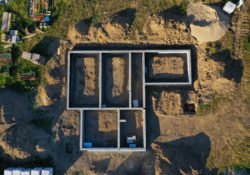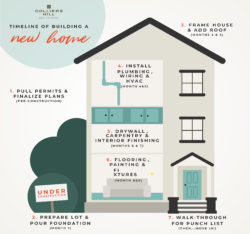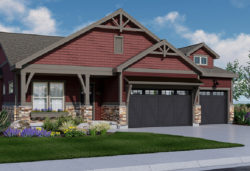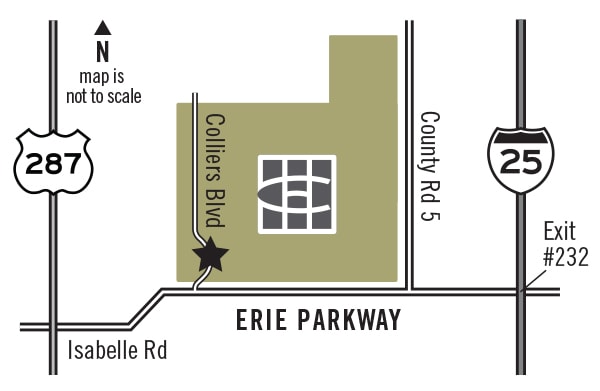New Build: From Moving Earth to Moving In
Unless you happen upon the perfect remodel in 2022, it’s hard to compare a new build with a resale while home-shopping. A remodel may look contemporary, but unless all the mechanical systems, appliances, roof and finishes were all replaced, there will likely be maintenance costs for the next 10 to 20 years. But how long does it REALLY take to build a house from the ground up? Here’s what can you expect when you buy in a new construction community.
After the Purchase Contract
 Once you sign a purchase contract with your builder, they will pull permits and finalize plans for your home according to the floor plan you picked and the elevation you chose. Then the site or lot will be cleared of brush, rocks and other debris and a surveyor will study the lot. Based on property boundaries and the plan or home design you chose, he or she will stake out the foundation location. Sometimes alterations are made to a property with earth-moving equipment to ensure adequate water flow across the site, and then the excavation for the foundation begins. Then you can expect an electrician to show up to hook up a temporary electrical panel. (Week 1)
Once you sign a purchase contract with your builder, they will pull permits and finalize plans for your home according to the floor plan you picked and the elevation you chose. Then the site or lot will be cleared of brush, rocks and other debris and a surveyor will study the lot. Based on property boundaries and the plan or home design you chose, he or she will stake out the foundation location. Sometimes alterations are made to a property with earth-moving equipment to ensure adequate water flow across the site, and then the excavation for the foundation begins. Then you can expect an electrician to show up to hook up a temporary electrical panel. (Week 1)
Foundations and Framing
 The footing and foundation work is next, which adds time for curing concrete, installing drain tile, waterproofing, back filling, and creating holes to allow for routing water supply and drain lines.
The footing and foundation work is next, which adds time for curing concrete, installing drain tile, waterproofing, back filling, and creating holes to allow for routing water supply and drain lines.
Next up is the third F: framing. Once footers have passed inspection, and the foundation is in place, you now have a stable structure for framing the floors, walls and roof of your home. Inspection speed bumps and inclement weather factors into this phase which can cause unavoidable delays.
HVAC, Plumbing and Electrical
 Subcontractors will now descend on the property to install important mechanicals like the heating and A/C units, plumbing and electrical systems. Once all of THAT work is completed, more subs will close the walls with insulation and drywall which will be sanded, primed and sometimes painted. The roofing and flashing work will be performed, as well as chimney installation. Windows need to be mounted now and doors and siding with trim are added to your home’s exterior.
Subcontractors will now descend on the property to install important mechanicals like the heating and A/C units, plumbing and electrical systems. Once all of THAT work is completed, more subs will close the walls with insulation and drywall which will be sanded, primed and sometimes painted. The roofing and flashing work will be performed, as well as chimney installation. Windows need to be mounted now and doors and siding with trim are added to your home’s exterior.
During the initial weeks of building, design decisions will come into play, based on early conversations you had with your builder. Items like carpeting, flooring (hardwood or engineered), kitchen and bathroom cabinets, tile, interior trim and mouldings will be installed now.
Finally, The Finishes
 Tradesmen and women will make frequent visits to the new home to install faucets, countertops, light fixtures, door hardware, mirrors, shower doors, rails, and appliances. If landscaping was an incentive or part of the whole purchase contract, the landscapers will be transforming your front and/or backyard with rocks, plants, bushes, trees and grass.
Tradesmen and women will make frequent visits to the new home to install faucets, countertops, light fixtures, door hardware, mirrors, shower doors, rails, and appliances. If landscaping was an incentive or part of the whole purchase contract, the landscapers will be transforming your front and/or backyard with rocks, plants, bushes, trees and grass.
Countdown to Closing
 The last few weeks of a home-building timeline include final inspections by the permitting agencies and a walk-through with your builder and/or contractor.
The last few weeks of a home-building timeline include final inspections by the permitting agencies and a walk-through with your builder and/or contractor.
You’ll want to make a “punch list” of things you’d like the builder to amend and once that punch list is completed – you’ll get the keys to your new home and move in!
A Builder Q&A Cheatsheet
 Selecting the right builder who can keep contractors and subcontract work happening on time and on schedule is a key step in building your dream home. Here are a few questions you can ask your builder up front and along the way.
Selecting the right builder who can keep contractors and subcontract work happening on time and on schedule is a key step in building your dream home. Here are a few questions you can ask your builder up front and along the way.
- How often can I visit the home during construction?
- What warranties do you provide?
- What standard features do your homes include?
- What are the major energy-saving features of the homes you build?
- Can you prewire my home for a security system?
- What about a smart thermostat, outlets or smart bulbs?
Keep in mind that even though builders have the process down to a science, in Colorado there can be unexpected weather delays that push delivery of a home past its projected due date. But for the most part, builders agree that the average start-to-finish timeframe for new home construction is approximately nine months to one year.
So Much More…In Colliers Hill
a With three of Colorado’s top home builders offering designs and models in Colliers Hill, from the paired offerings built by K B Home, to the amazing variety of floor plans and elevations from Richmond American and Boulder Creek – priced from the $500s – there’s something for every family and every budget. Add to that the array of amenities, the proximity to main thoroughfares and the airport, and the walkability of this master-planned community – making it a great place to call home!
With three of Colorado’s top home builders offering designs and models in Colliers Hill, from the paired offerings built by K B Home, to the amazing variety of floor plans and elevations from Richmond American and Boulder Creek – priced from the $500s – there’s something for every family and every budget. Add to that the array of amenities, the proximity to main thoroughfares and the airport, and the walkability of this master-planned community – making it a great place to call home!


